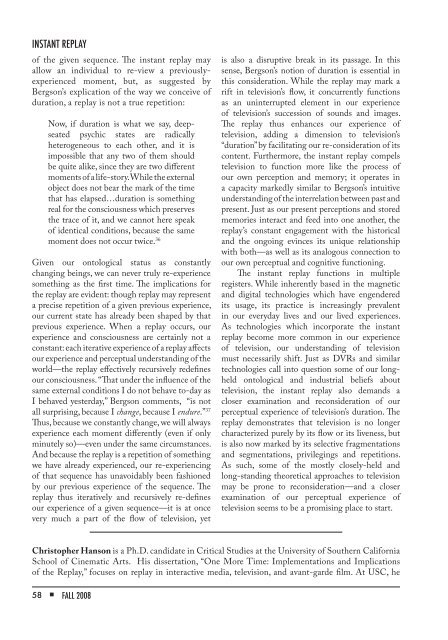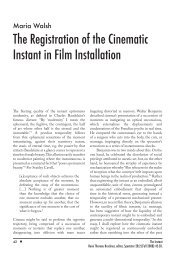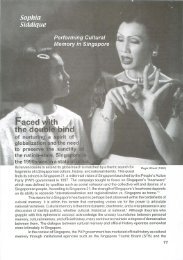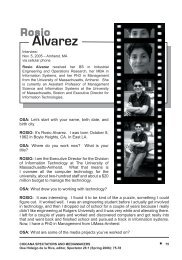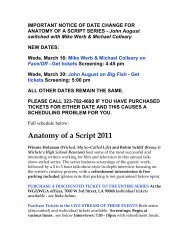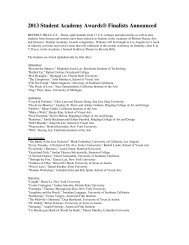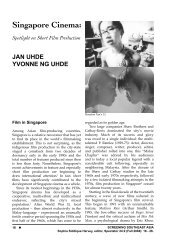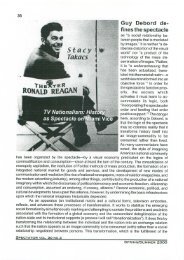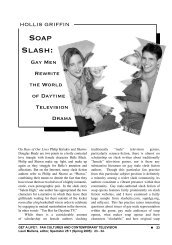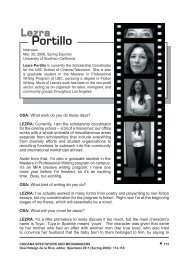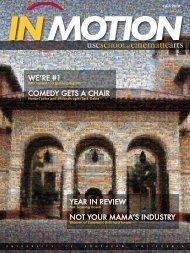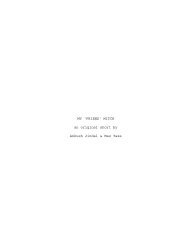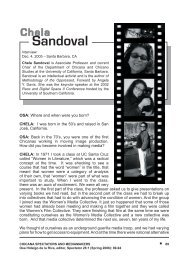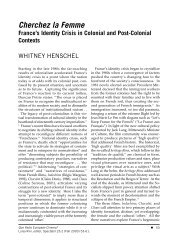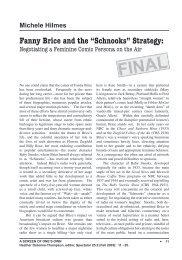The Instant Replay - USC School of Cinematic Arts - University of ...
The Instant Replay - USC School of Cinematic Arts - University of ...
The Instant Replay - USC School of Cinematic Arts - University of ...
Create successful ePaper yourself
Turn your PDF publications into a flip-book with our unique Google optimized e-Paper software.
insTanT REplay<br />
<strong>of</strong> the given sequence. <strong>The</strong> instant replay may<br />
allow an individual to re-view a previouslyexperienced<br />
moment, but, as suggested by<br />
Bergson’s explication <strong>of</strong> the way we conceive <strong>of</strong><br />
duration, a replay is not a true repetition:<br />
Now, if duration is what we say, deepseated<br />
psychic states are radically<br />
heterogeneous to each other, and it is<br />
impossible that any two <strong>of</strong> them should<br />
be quite alike, since they are two different<br />
moments <strong>of</strong> a life-story. While the external<br />
object does not bear the mark <strong>of</strong> the time<br />
that has elapsed…duration is something<br />
real for the consciousness which preserves<br />
the trace <strong>of</strong> it, and we cannot here speak<br />
<strong>of</strong> identical conditions, because the same<br />
moment does not occur twice. 36<br />
Given our ontological status as constantly<br />
changing beings, we can never truly re-experience<br />
something as the first time. <strong>The</strong> implications for<br />
the replay are evident: though replay may represent<br />
a precise repetition <strong>of</strong> a given previous experience,<br />
our current state has already been shaped by that<br />
previous experience. When a replay occurs, our<br />
experience and consciousness are certainly not a<br />
constant: each iterative experience <strong>of</strong> a replay affects<br />
our experience and perceptual understanding <strong>of</strong> the<br />
world—the replay effectively recursively redefines<br />
our consciousness. “That under the influence <strong>of</strong> the<br />
same external conditions I do not behave to-day as<br />
I behaved yesterday,” Bergson comments, “is not<br />
all surprising, because I change, because I endure.” 37<br />
Thus, because we constantly change, we will always<br />
experience each moment differently (even if only<br />
minutely so)—even under the same circumstances.<br />
And because the replay is a repetition <strong>of</strong> something<br />
we have already experienced, our re-experiencing<br />
<strong>of</strong> that sequence has unavoidably been fashioned<br />
by our previous experience <strong>of</strong> the sequence. <strong>The</strong><br />
replay thus iteratively and recursively re-defines<br />
our experience <strong>of</strong> a given sequence—it is at once<br />
very much a part <strong>of</strong> the flow <strong>of</strong> television, yet<br />
58 FALL 2008<br />
is also a disruptive break in its passage. In this<br />
sense, Bergson’s notion <strong>of</strong> duration is essential in<br />
this consideration. While the replay may mark a<br />
rift in television’s flow, it concurrently functions<br />
as an uninterrupted element in our experience<br />
<strong>of</strong> television’s succession <strong>of</strong> sounds and images.<br />
<strong>The</strong> replay thus enhances our experience <strong>of</strong><br />
television, adding a dimension to television’s<br />
“duration” by facilitating our re-consideration <strong>of</strong> its<br />
content. Furthermore, the instant replay compels<br />
television to function more like the process <strong>of</strong><br />
our own perception and memory; it operates in<br />
a capacity markedly similar to Bergson’s intuitive<br />
understanding <strong>of</strong> the interrelation between past and<br />
present. Just as our present perceptions and stored<br />
memories interact and feed into one another, the<br />
replay’s constant engagement with the historical<br />
and the ongoing evinces its unique relationship<br />
with both—as well as its analogous connection to<br />
our own perceptual and cognitive functioning.<br />
<strong>The</strong> instant replay functions in multiple<br />
registers. While inherently based in the magnetic<br />
and digital technologies which have engendered<br />
its usage, its practice is increasingly prevalent<br />
in our everyday lives and our lived experiences.<br />
As technologies which incorporate the instant<br />
replay become more common in our experience<br />
<strong>of</strong> television, our understanding <strong>of</strong> television<br />
must necessarily shift. Just as DVRs and similar<br />
technologies call into question some <strong>of</strong> our longheld<br />
ontological and industrial beliefs about<br />
television, the instant replay also demands a<br />
closer examination and reconsideration <strong>of</strong> our<br />
perceptual experience <strong>of</strong> television’s duration. <strong>The</strong><br />
replay demonstrates that television is no longer<br />
characterized purely by its flow or its liveness, but<br />
is also now marked by its selective fragmentations<br />
and segmentations, privilegings and repetitions.<br />
As such, some <strong>of</strong> the mostly closely-held and<br />
long-standing theoretical approaches to television<br />
may be prone to reconsideration—and a closer<br />
examination <strong>of</strong> our perceptual experience <strong>of</strong><br />
television seems to be a promising place to start.<br />
Christopher Hanson is a Ph.D. candidate in Critical Studies at the <strong>University</strong> <strong>of</strong> Southern California<br />
<strong>School</strong> <strong>of</strong> <strong>Cinematic</strong> <strong>Arts</strong>. His dissertation, “One More Time: Implementations and Implications<br />
<strong>of</strong> the <strong>Replay</strong>,” focuses on replay in interactive media, television, and avant-garde film. At <strong>USC</strong>, he


